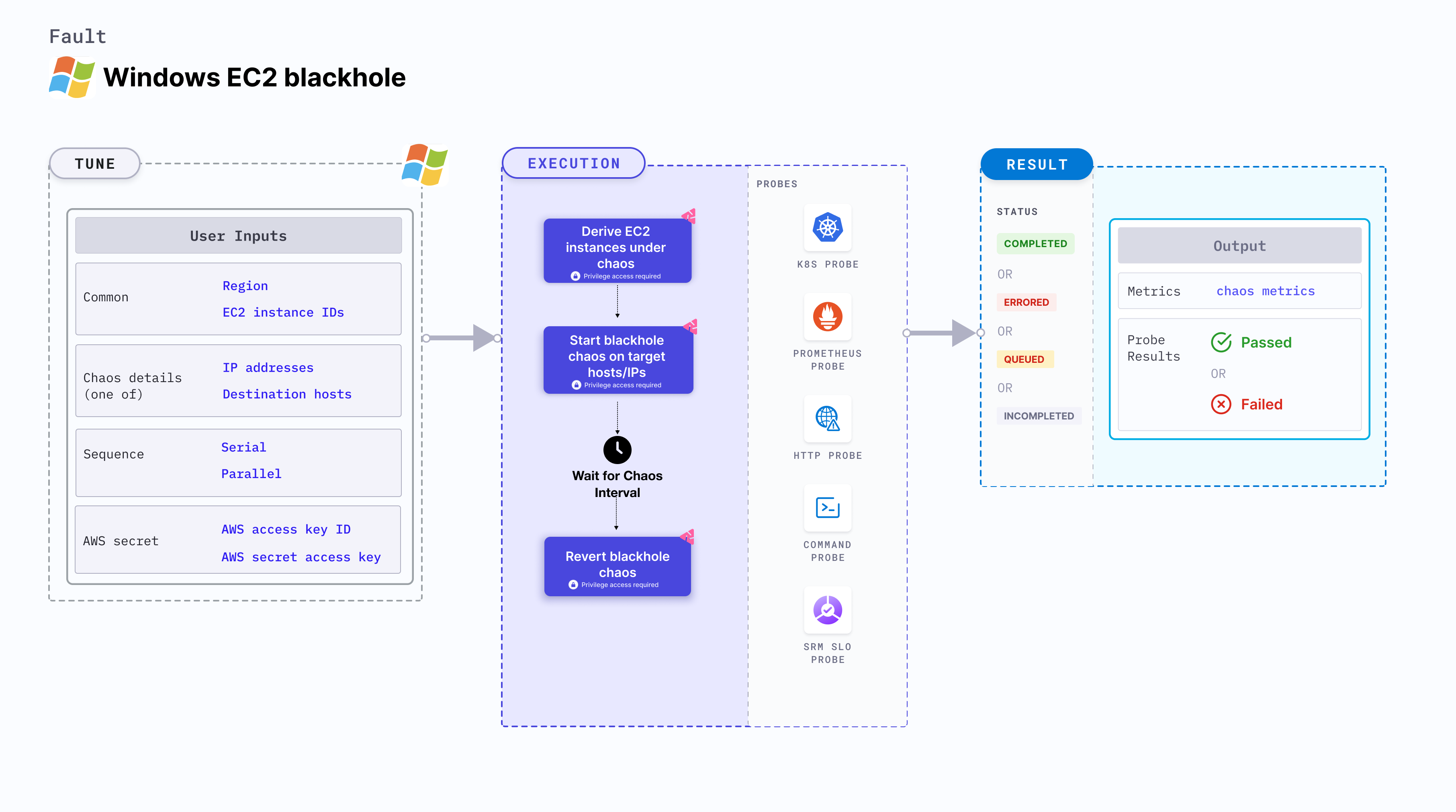Windows EC2 blackhole chaos
Windows EC2 blackhole chaos results in loss of access to the given target hosts or IPs by injecting firewall rules. This fault:
- Degrades the network without marking the EC2 instance as unhealthy (or unworthy) of traffic. This can be resolved by using a middleware that switches the traffic based on certain SLOs (performance parameters).
- Limits the impact, that is, blast radius to only the traffic that you wish to test, by specifying the destination hosts or IP addresses.

Use cases
Windows EC2 blackhole chaos determines the performance of the application (or process) running on the EC2 instances.
Prerequisites
- Kubernetes >= 1.17
- The EC2 instance must be in a healthy state.
- SSM agent must be installed and running on the target EC2 instance.
- Kubernetes secret must have the AWS Access Key ID and Secret Access Key credentials in the
CHAOS_NAMESPACE. Below is a sample secret file:apiVersion: v1
kind: Secret
metadata:
name: cloud-secret
type: Opaque
stringData:
cloud_config.yml: |-
# Add the cloud AWS credentials respectively
[default]
aws_access_key_id = XXXXXXXXXXXXXXXXXXX
aws_secret_access_key = XXXXXXXXXXXXXXXXXXXXXXXXXXXXXXXXXXXX
HCE recommends that you use the same secret name, that is, cloud-secret. Otherwise, you will need to update the AWS_SHARED_CREDENTIALS_FILE environment variable in the fault template with the new secret name and you won't be able to use the default health check probes.
Below is an example AWS policy to execute the fault.
{
"Version": "2012-10-17",
"Statement": [
{
"Effect": "Allow",
"Action": [
"ssm:GetDocument",
"ssm:DescribeDocument",
"ssm:GetParameter",
"ssm:GetParameters",
"ssm:SendCommand",
"ssm:CancelCommand",
"ssm:CreateDocument",
"ssm:DeleteDocument",
"ssm:GetCommandInvocation",
"ssm:UpdateInstanceInformation",
"ssm:DescribeInstanceInformation"
],
"Resource": "*"
},
{
"Effect": "Allow",
"Action": [
"ec2messages:AcknowledgeMessage",
"ec2messages:DeleteMessage",
"ec2messages:FailMessage",
"ec2messages:GetEndpoint",
"ec2messages:GetMessages",
"ec2messages:SendReply"
],
"Resource": "*"
},
{
"Effect": "Allow",
"Action": [
"ec2:DescribeInstanceStatus",
"ec2:DescribeInstances"
],
"Resource": [
"*"
]
}
]
}
- Go to AWS named profile for chaos to use a different profile for AWS faults.
- Go to superset permission/policy to execute all AWS faults.
Mandatory tunables
| Tunable | Description | Notes |
|---|---|---|
| EC2_INSTANCE_ID | ID of the target EC2 instance. | For example, i-044d3cb4b03b8af1f. Provide any one value either instance id or tag. |
| EC2_INSTANCE_TAG | Tag of the target EC2 instances. Provide any one value, either the instance Id or the tag. | For example, type:chaos. |
| REGION | AWS region ID where the EC2 instance has been created. | For example, us-east-1. |
Optional tunables
| Tunable | Description | Notes |
|---|---|---|
| TOTAL_CHAOS_DURATION | Duration that you specify, through which chaos is injected into the target resource (in seconds). | Default: 30 s. For more information, go to duration of the chaos. |
| AWS_SHARED_CREDENTIALS_FILE | Path to the AWS secret credentials. | Default: /tmp/cloud_config.yml. |
| IP_ADDRESSES | IP addresses of the services whose accessibility is impacted. | Comma-separated IP(s) can be provided. For more information, go to destination IPs. |
| DESTINATION_HOSTS | DNS Names of the services whose accessibility is impacted. | If this value is not provided, the fault induces network chaos for all IPs or destinations or IP_ADDRESSES if already defined. For more information, go to destination hosts. |
| SEQUENCE | Sequence of chaos execution for multiple instances. | Default: parallel. Supports serial and parallel. For more information, go to sequence of chaos execution. |
| RAMP_TIME | Period to wait before and after injecting chaos (in seconds). | For example, 30 s. For more information, go to ramp time. |
Run with destination IPs
IP addresses of the services that interrupt the traffic. Tune it by using the IP_ADDRESSES environment variable.
The following YAML snippet illustrates the use of this environment variable:
# it injects the chaos into the egress traffic for specific IPs/hosts
apiVersion: litmuschaos.io/v1alpha1
kind: ChaosEngine
metadata:
name: engine-nginx
spec:
engineState: "active"
chaosServiceAccount: litmus-admin
experiments:
- name: windows-ec2-blackhole-chaos
spec:
components:
env:
# supports comma-separated destination ips
- name: IP_ADDRESSES
value: '8.8.8.8,192.168.5.6'
- name: EC2_INSTANCE_ID
value: 'instance-1'
- name: REGION
value: 'us-west-2'
Run with destination hosts
Hosts that interrupt the traffic by default. These are the DNS names of the services whose accessibility is impacted. Tune it by using the DESTINATION_HOSTS environment variable.
The following YAML snippet illustrates the use of this environment variable:
# it injects the chaos into the egress traffic for specific IPs/hosts
apiVersion: litmuschaos.io/v1alpha1
kind: ChaosEngine
metadata:
name: engine-nginx
spec:
engineState: "active"
chaosServiceAccount: litmus-admin
experiments:
- name: windows-ec2-blackhole-chaos
spec:
components:
env:
# supports comma-separated destination hosts
- name: DESTINATION_HOSTS
value: 'google.com'
- name: EC2_INSTANCE_ID
value: 'instance-1'
- name: REGION
value: 'us-west-2'